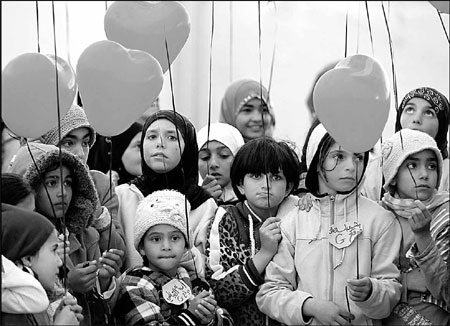Worn-down rebels in Damascus halt fighting
Ceasefire in suburb one of several deals struck across Syrian capital
Overwhelmed by hunger and outgunned by their opponents, Syrian rebels in the Damascus suburb of Barzeh finally bowed to the inevitable and agreed to a ceasefire with Syrian government forces.
It was one of several similar deals struck around Damascus, allowing a semblance of normalcy to return to some districts. The government proclaimed a homegrown reconciliation process with local fighters - though not with foreign Jihadists.
But in Barzeh the truce agreed to in January tastes like defeat for fighters who once hoped to overrun the capital, topple President Bashar al-Assad and win a conflict that enters its fourth year this month.
The army siege of Barzeh, part of a nationwide campaign against opposition strongholds, which some officials refer to as "starvation until submission", wore down rebel resistance.
"They knew exactly when to approach us with a ceasefire agreement," said Abu Yahya, a rebel spokesman.
"We got tired. We didn't have enough men toward the end. The guys were exhausted pulling 24-hour guard duty, in addition to fighting," he told a Reuters reporter visiting Barzeh last week. "We were hungry, and even though we remained steadfast, in the end psychologically we were beaten."
The streets of Barzeh, around 5 km north of central Damascus, have been pulverized by air raids and fighting. At the height of the violence, bodies lay uncollected in the open for days, residents said.
Now, food and medicine, once in desperately short supply, come in relatively freely, and some families who fled have returned, although many have found their homes in ruins.
Ceasefires have also been reached in the western Damascus suburb of Mouadamiya and Qudsaya to the north, and Yalda, Beit Sahm, Yarmouk and Babilla to the south.
Government officials say local fighters could be eligible for amnesty or even reintegration into government forces. The unspoken message is that Syrians will resolve the catastrophic civil war by themselves, ignoring international mediation and any demands for Assad to make concessions to his foes.
This is reinforced by signs that Assad will run for re-election this summer, and by his visit this week to a refuge for displaced people outside Damascus, where he told a cheering audience: "The state is for every Syrian."
Fragile truce
In accepting the truce, the Barzeh fighters swallowed a bitter pill. "Many rebels were badly wounded toward the end, when the siege got very bad and we couldn't smuggle any medical equipment or food to help them," Abu Yahya said. Around 120 fighters from an original rebel force of 700 were killed in a two-year struggle for the suburb, he added.
In many areas where truces were agreed to, the army has remained on the periphery in return for symbolic steps such as replacing the rebel flag with the Syrian flag.
The deals are fragile - in Qudsaya, for example, the army reimposed its siege - and leave much unresolved including the fate of gunmen inside rebel areas and demands for the release of detainees.
But for the government forces around Barzeh the benefits are clear. They are able to redeploy to other conflict areas and have regained access to the adjacent pro-Assad neighborhood of Ish al-Warwar, home to military families who had been cut off from central Damascus by the fighting.
"Our leadership is a genius to come up with the ceasefire idea in Barzeh," one intelligence officer boasted in an overheard conversation with a taxi driver in Damascus. "We turned the rebels from fighters into bunnies in our hands."
In Barzeh last week, rebels were seen walking about or manning a checkpoint, generally relaxed but wary of strangers. At times they were armed, wearing rebel fatigues or civilian clothing. Some of them hobbled around on crutches.
But many people are suspicious of the agreement because their main demand has yet to be met. "We still want our detainees, whom the government hasn't released. The ceasefire is good but it needs to be fully implemented. The detainees are our children, and holding them is unjust," said a community elder known as Haji, who is revered by young rebels.
|
Young Syrian refugees prepare to release red balloons at Al Zaatari Syrian refugee camp, the largest Syrian refugee camp in Jordan, in the city of Mafraq, on Thursday. The release of red balloons will also take place in New York, Washington, Moscow and Paris in an effort to raise awareness on the third anniversary of the Syrian conflict. Muhammad Hamed / Reuters |
(China Daily 03/15/2014 page7)















